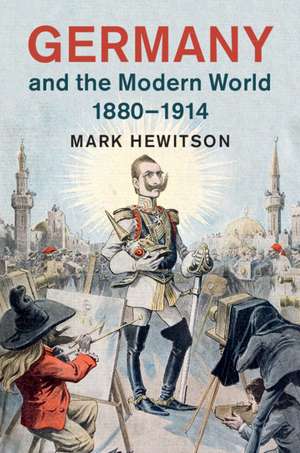Germany and the Modern World, 1880–1914
Autor Mark Hewitsonen Limba Engleză Paperback – 4 iul 2018
| Toate formatele și edițiile | Preț | Express |
|---|---|---|
| Paperback (1) | 242.60 lei 3-5 săpt. | +32.95 lei 10-14 zile |
| Cambridge University Press – 4 iul 2018 | 242.60 lei 3-5 săpt. | +32.95 lei 10-14 zile |
| Hardback (1) | 714.19 lei 6-8 săpt. | |
| Cambridge University Press – 4 iul 2018 | 714.19 lei 6-8 săpt. |
Preț: 242.60 lei
Nou
Puncte Express: 364
Preț estimativ în valută:
46.42€ • 48.60$ • 38.41£
46.42€ • 48.60$ • 38.41£
Carte disponibilă
Livrare economică 15-29 martie
Livrare express 04-08 martie pentru 42.94 lei
Preluare comenzi: 021 569.72.76
Specificații
ISBN-13: 9781107611993
ISBN-10: 1107611997
Pagini: 528
Ilustrații: 25 b/w illus. 3 maps 17 tables
Dimensiuni: 153 x 228 x 26 mm
Greutate: 0.86 kg
Editura: Cambridge University Press
Colecția Cambridge University Press
Locul publicării:New York, United States
ISBN-10: 1107611997
Pagini: 528
Ilustrații: 25 b/w illus. 3 maps 17 tables
Dimensiuni: 153 x 228 x 26 mm
Greutate: 0.86 kg
Editura: Cambridge University Press
Colecția Cambridge University Press
Locul publicării:New York, United States
Cuprins
Introduction: nation, empire, globe; 1. Colonial fantasies and imperialism; 2. Germany looks to the West (and the East); 3. Nationalism and racism; 4. Europe and the crisis of the German state; 5. Weltwirtschaft: industrialization and national competition; 6. A world of enemies? Global empires and European powers; Conclusion: around the world in eighty days.
Recenzii
'In Germany and the Modern World, 1880–1914 Mark Hewitson develops an astutely measured, non-polemical appraisal of the concept of the 'globalized nation' on the eve of the First World War, setting the irreducible Europeanness of Germany's dynamism beside and against the wider overseas expansionism. An authoritative, timely and beautifully executed intervention.' Geoff Eley, University of Michigan
'This is simply an impressive contribution by Mark Hewitson. The book makes a timely, crucial and critical contribution to the German Empire and its interwoven relationships within Europe and beyond in a globalizing world around 1900.' Bernhard Struck, University of St Andrews
'This is a welcome historical analysis of German national identity in the era before the First World War, during what is often called the 'first global age'. The study, which challenges many of the claims made about the impact of globalization, is certain to provoke reflection and controversy.' Roger Chickering, Georgetown University, Washington DC
'Wide ranging and ambitious, Hewitson's examination of the process of German nation building integrates topics that include modernity, globalization, transnationalism, imperialism, nationalism, and racism. Scholars will also find considerable value in Hewitson's extensive engagement throughout with varied strands of historiographic literature. Highly recommended.' A. C. Stanley, Choice
'By highlighting the ways in which the expansion of transnational contacts and networks shaped - or failed to shape - public discourses on imperialism, nationalism, economics, and foreign policy, he makes a compelling case for continuing to situate the nation-state at, or near, the center of studies of the first phase of globalization. As a result, Germany and the Modern World, 1880–1914 will be essential reading for scholars and students of German history on the eve of the 'short twentieth century'.' Gavin Wiens, H-Transnational German Studies
'Hewitson has written a very balanced book, full of new and often surprising insights … He debunks many traditional assumptions, and presents interesting contemporary illustrations … A timely and welcome book indeed.' Martijn Lak, European History Quarterly
'This is simply an impressive contribution by Mark Hewitson. The book makes a timely, crucial and critical contribution to the German Empire and its interwoven relationships within Europe and beyond in a globalizing world around 1900.' Bernhard Struck, University of St Andrews
'This is a welcome historical analysis of German national identity in the era before the First World War, during what is often called the 'first global age'. The study, which challenges many of the claims made about the impact of globalization, is certain to provoke reflection and controversy.' Roger Chickering, Georgetown University, Washington DC
'Wide ranging and ambitious, Hewitson's examination of the process of German nation building integrates topics that include modernity, globalization, transnationalism, imperialism, nationalism, and racism. Scholars will also find considerable value in Hewitson's extensive engagement throughout with varied strands of historiographic literature. Highly recommended.' A. C. Stanley, Choice
'By highlighting the ways in which the expansion of transnational contacts and networks shaped - or failed to shape - public discourses on imperialism, nationalism, economics, and foreign policy, he makes a compelling case for continuing to situate the nation-state at, or near, the center of studies of the first phase of globalization. As a result, Germany and the Modern World, 1880–1914 will be essential reading for scholars and students of German history on the eve of the 'short twentieth century'.' Gavin Wiens, H-Transnational German Studies
'Hewitson has written a very balanced book, full of new and often surprising insights … He debunks many traditional assumptions, and presents interesting contemporary illustrations … A timely and welcome book indeed.' Martijn Lak, European History Quarterly
Notă biografică
Descriere
Re-assesses Germany's relationship with the wider world before 1914 by examining the connections between nationalism, transnationalism, imperialism and globalization.
